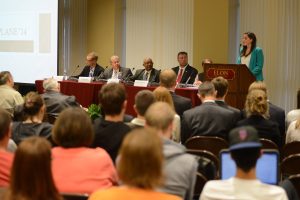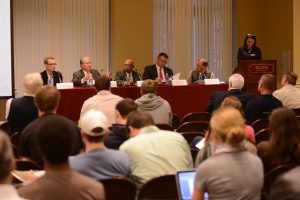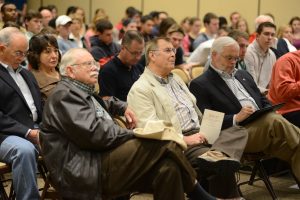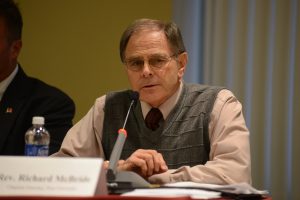A conversation between students, faculty, experts & the community explored how various factors - mental health, the economy and the media, to name a few - contribute to harm from firearms.

For all of the recent media attention paid to policy debates on background checks and assault weapon bans in the wake of last year’s Sandy Hook Elementary School massacre, gun control measures weren’t the only topics discussed Wednesday evening at an Elon University forum on firearm violence.
Far from it. There was the need to better help the mentally ill in the United States. There was discussion of the role the media may play in desensitizing people to death and destruction from guns. There was concern shared about the health care costs to treat people affected by violence.
Suicide. Substance abuse. Domestic violence. School safety. All were cited and, to varying degrees, debated May 1 in a program that brought together students, faculty, policy makers and members of the surrounding community for what was billed as an “open, educational, and respectful” discussion.
Organizers estimated a crowd size that approached 200 people. It was live-streamed by Elon Local News, the university’s student-run broadcast news organization, and broadcast by campus radio station WSOE 89.3.
“As a teaching moment, I think we did what a university is supposed to do, which is provide meaningful opportunities and experiences for a wide number of students,” said Professor Tom Arcaro, a co-chair of the forum’s organizing committee. “Our students learned things that they hadn’t anticipated learning and I think community members learned some things they hadn’t anticipated learning. That is the connection with the overall mission of Elon University that I think we made.”

In addition to an expert panel comprised of the Town of Elon police chief, a North Carolina state lawmaker, a Burlington city councilman, the university’s chaplain emeritus and an Elon Law professor, the forum afforded a dozen members of the campus community time to offer prepared remarks.
A few urged caution at imposing restrictions on law-abiding gun owners when other avenues exist to reduce the effects of gun violence.
“There arguably are more guns then there are people, which means there is not a correlation between the number of guns and the number of murders,” said Elon freshman Jonathan Bass. “Imposing gun legislation upon the law abiding will not regulate the lawless. Instead of imposing new gun regulations, why don’t we allocate the U.S. Department of Justice the necessary resources to prosecute criminals?”
Jason Springer, assistant director of academic advising at the university and a registered concealed carry gun owner, made similar points while emphasizing social issues that touch upon gun violence.
“What roles do poverty, education, media, parenting, drug policy, mental health policy and popular culture have on violence?” Springer said. “I urge caution when we seek to diminish the rights of a few for the perceived safety of the many.”

Assistant Professor Jeffrey Carpenter in the School of Education offered the opposite view with an emphasis on school safety. He said it makes no sense that Americans consent to regulations of ladders, seat belts and other household goods, but many people cringe at the idea of regulating firearms.
“There are even certain raw cheeses that are banned in our country. If we can have cheese regulation, can we have gun regulation?” Carpenter said. “Let’s take action so that 10 years from now we can look back and say something good came out of the Newtown tragedy and that our schools became safer as a result.”
The specter of the Sandy Hook Elementary School shooting from December 2012 served as a backdrop for many comments. The Connecticut tragedy claimed the lives of 20 children and six school employees, and it spurred federal legislation on closing background check loopholes that only recently failed to pass in Washington.
One student commented that everyone knows the named of the Sandy Hook shooter – Adam Lanza – but that few people likely can name even one of his victims. That should change, she said.
And just as Lanza’s mental health is thought to be a part of what sparked his rage, Elon University students at the McKinnon Hall forum argued that resources for the mentally ill are just as important to addressing gun violence as are background checks or limits on the number of rounds in a magazine clip.
Others pointed out that health care costs are impacted by gun violence, even for those never struck by a bullet. “Mental health concerns, such as depression and anxiety, may also follow as a result of gun violence, which places more burdens on our health system and its professionals,” said Elon University junior Emily Delaplane.

For the Rev. Richard McBride, Elon University’s chaplain emeritus, a broader question remains unrelated to the specifics of restrictions or rights. “How did we get to a point where an assault rifle is something that people want to possess? How did the shift happen where we now need that kind of weaponry in our hands?” he pondered. “What concerns me is the militarization of the family home.”
Moderated by Associate Provost Connie Book, expert guests who answered audience questions also included Celo Faucette from the Burlington City Council; Rep. Stephen Ross of the North Carolina General Assembly; Cliff Parker, chief of the Town of Elon Police Department; and Michael Rich, an associate professor at the Elon University School of Law.
“Any time we come together, like we are tonight, to talk to one another and to listen to one another, we often find that we are not that far apart, which gets us closer to solutions,” said Parker as he encouraged students to consider public service as a career. “It’s a wonderful way to give back. It’s a wonderful way to help others. And it’s a wonderful way to be a part of solutions.”
For more information, visit the forum’s website at http://www.elon.edu/gunviolence.


